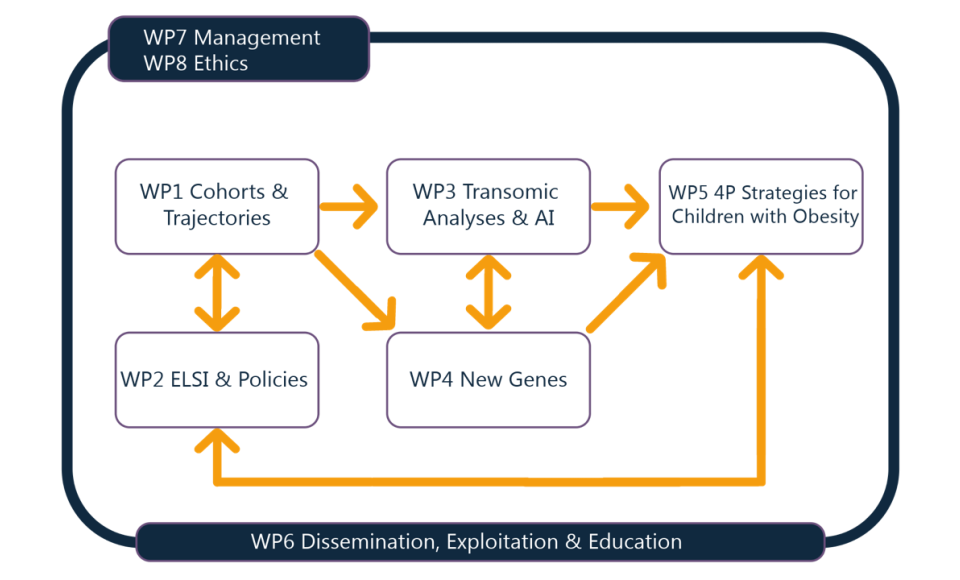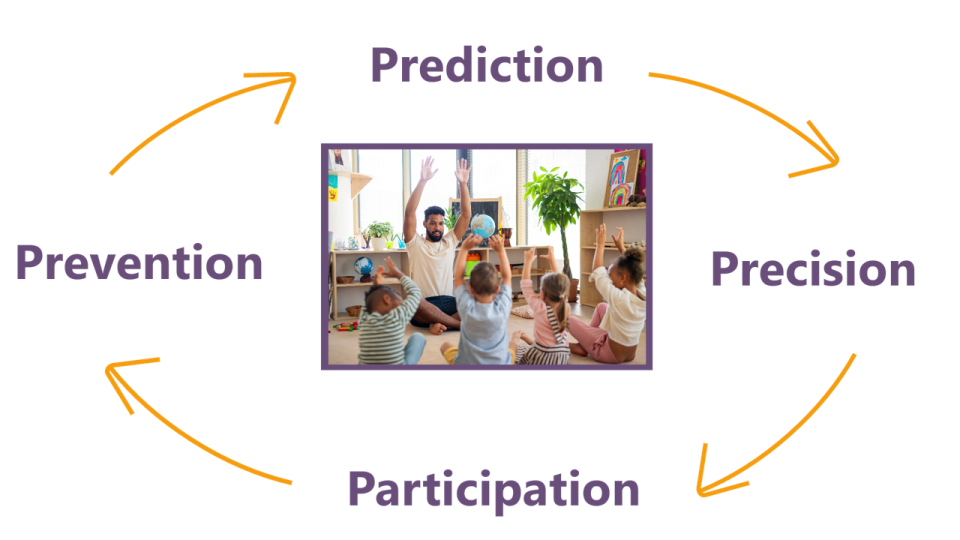The rise in childhood obesity demands our immediate attention. This trend is concerning because obesity in childhood often leads to health issues in later life.
The main concept behind Obelisk is dedicated to understanding, predicting, and preventing obesity in children and providing precision medicine for those affected.
The 4P’s approach of Obelisk involves active participation from all stakeholders, including families, scientific and medical communities, daycare centres, schools, policymakers, and industry, to drive social innovation and achieve successful outcomes.
Obelisk will produce several Key Exploitable Results, which are significant outputs from the research. These results will be disseminated to the scientific community, healthcare practitioners, European citizens, and policymakers, with varying distribution levels depending on their commercial sensitivity.
This project includes 16 partners from universities, research institutions and small and medium-sized enterprises from across nine European countries.
Aims
Obelisk aims to advance our understanding of the molecular mechanisms contributing to or preventing childhood obesity. It seeks to develop tools for early prediction and prevention, identify new genes associated with childhood obesity, and explore targeted approaches for prevention. The project will also conduct a clinical study on an existing drug to reverse obesity in individuals with a genetic predisposition. Obelisk will disseminate best practices, educate others on preventing and treating childhood obesity, and collaborate with other initiatives to optimise knowledge and joint activities.
The project is built on a participatory approach, with engagement from families and carers, daycare providers and schools, local authorities, the healthcare industry, policymakers, and the scientific and academic communities.
Tor Vergata Research Team
The research team from the University of Rome Tor Vergata, Prof. Federico Belotti, Francesca Marazzi and Pietro Monti led by Prof Vincenzo Atella and Andrea Piano Mortari, will be responsible for quantifying the costs associated with childhood obesity, evaluating the cost-effectiveness of proposed interventions, and analyzing their behavioral aspects.. According to Francesca Marazzi, responsible for experimental analysis, "It is of fundamental importance to identify the determinants of childhood obesity, both of a socio-economic and behavioral nature, in order to design policy interventions that are truly capable of promoting behavioral changes in both children and their parents, towards healthier consumption choices and lifestyles that can persist into adulthood."
Our research team has been involved in the following activities:

WP1 - Cohorts & Trajectories: Implementation of a harmonized FAIR repertoire of longitudinal cohorts for trajectory analysis, multi-omics and economics
Task 1.4 – Dynamic life-course model frameworks and software
Task 1.5 – Economic Microsimulation (LEAD)
UNITOV will perform micro-simulation analyses to deliver precise evaluation of the present and future health, social and economic burden of obesity and will assess the cost-effectiveness of the treatments provided by national health systems by building policy relevant “what-if” scenarios 25,26. Yhe analyses will draw on the expertise of several EU projects.
WP5 - 4P strategies for children with obesity
Task 5.2 – Treatment of teenagers with obesity from low-income families (ADOBESIF)
WP6 – Dissemination, exploitation and education
Task 6.4 – OBELISK Policy Program
WP7 - Management and coordination
Partners
Our ambitious research programme will be implemented over five years by a consortium of 16 partners across Europe.
This ambitious project includes 16 partners from universities, research institutions and small and medium-sized enterprises from across nine European countries. The consortium has received funding from the EU’s Horizon Europe Research and Innovation programme and from UK and Swiss research funding bodies.
Project Coordinator
Institut National de la Santé et de la Recherche Médicale (INSERM)
Project Partners
German Institute of Human Nutrition Potsdam-Rehbruecke (DIFE)
Hospital del Mar Medical Research Institut (IMIM)
Lille University Hospital (CHU LILLE)
Nencki Institute of Experimental Biology
Assistance Publique–Hôpitaux de Paris (APHP)
SIB Swiss Institute of Bioinformatics (SIB) Associated
Technical University of Munich (TUM)
European Childhood Obesity Group (ECOG)
Tor Vergata University of Rome (UTOV)
University of Verona (UNIVR) Affiliated
Funding
Obelisk has received funding from the European Union’s Horizon Europe Research and Innovation programme under grant agreement 101080465. UK participant in Horizon Europe Project Obelisk is supported by UKRI grant number 10077650 (Beta Technology). This work is further supported by the Swiss State Secretariat for Education‚ Research and Innovation (SERI) under contract number 23.00160.
The consortium has received 9.5 million Euro from the EU’s Horizon Europe Research and Innovation programme and an additional 1.7 million Euro from UK and Swiss research funding bodies.
Tor Vergata’s budget is 420 431,25 €
Contacts
Principal Investigator
Andrea Piano Mortari
andrea.pianomortari@uniroma2.eu
CEIS Secretariat
segr.ceis@economia.uniroma2.it
Postdoctoral Researcher
Longitudinal Analysis and Policy Implications of Childhood Obesity Dynamics
The OBELISK project funded by Horizon Europe, investigates how early-life growth shapes long-term health and economic outcomes, using harmonised cohort data, federated infrastructures, and advanced modelling.
The postdoctoral researcher will join the economic modelling team at the University of Rome Tor Vergata, contributing to dynamic microsimulation models that project health and economic consequences of obesity trajectories and assess potential policy interventions. The role involves collaboration with partners on trajectory modelling, data infrastructures, and the integration of causal and econometric approaches.
Applications must be submitted exclusively through the following online portal: https://pica.cineca.it/uniroma2/cr20250104/
The full call, eligibility criteria, and deadlines are available on the application page.
Obelisk has received funding from the European Union’s Horizon Europe Research and Innovation programme under grant agreement 101080465. UK participant in Horizon Europe Project Obelisk is supported by UKRI grant number 10077650 (Beta Technology). This work is further supported by the Swiss State Secretariat for Education‚ Research and Innovation (SERI) under contract number 23.00160.




